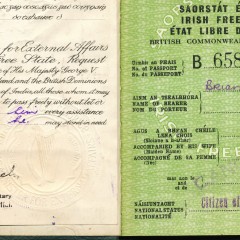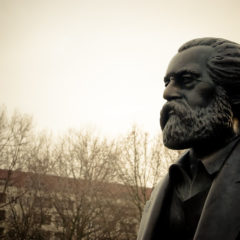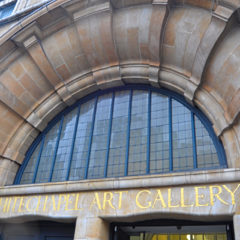Upstaging Ireland
Birkbeck's Arts Week is an annual festival of workshops, lectures and activities around the School of Arts in Bloomsbury. In 2020, quarantine measures have meant that all events are taking place online, over several 'Arts Weeks'. As part of this provision, on 1st June, Birkbeck published the podcast Upstaging Ireland: The Theatre of Flann O'Brien. Flann O'Brien (also known as Brian O'Nolan and Myles na gCopaleen) was an Irish comic writer whose work has been considered at a series of previous Arts Week events. This year's contribution is on a lesser-known aspect of his work: his writing for the theatre. The plays Thirst (1942), Faustus Kelly (1943) and Rhapsody in Stephen's Green: The Insect Play (1943) represent an extraordinary burst of dramatic creativity, and were first produced at Dublin's Abbey Theatre and Gate Theatre. The podcast draws on the expertise of Tobias Harris, who has recently produced a doctoral thesis on Flann O'Brien, and Hugh Wilde provides four readings from the plays. It can be heard in full here. Image from Burns Library, Boston College, used under a CC BY-NC-ND 2.0 licence....
Crossings: Marx in 2020
Two members of Birkbeck's Centre for Contemporary Literature appear in the new issue of the journal Crossings, produced from the University of Dhaka. The issue, edited by Professor Shamsad Mortuza, is a special volume on the work of Karl Marx, revisited from contemporary perspectives, and derives in part from a conference on Marx at 200 held in 2018. Contributors to the volume hail from a range of geographical locations, including Bangladesh, Denmark, the United States. Some of the articles represent a reading of Marx from an Asian perspective. Amid this diversity of contributions, the volume also contains an essay by Birkbeck's Joseph Brooker on representations of working-class life in the 1980s, drawing on the socialist critic Raymond Williams; and an Marxian analysis of the television drama The Fall by Sean O'Brien, until recently Director of our MA in Contemporary Literature & Culture and now a Research Fellow at the Department of English, Theatre & Creative Writing. The whole volume is Open Access and can be read here. Image by fhwrdh, used under a CC BY 2.0 licence....
Radio During Lockdown
by Emily Best Barring climate change or maybe globalisation, the pandemic crisis of 2020 is arguably the widest-ranging event in terms of human impact since the Second World War. It drops individual instances – statistics, directives, shock photographs of packed roads on sunny days and videos of grandchildren getting hugged through cellophane – into the inertia of waiting. Those staying inside whether through furlough, home working or isolation experience the changes both fast and slow, immediate and projected, via the same screens, on the same sofas and through the same windows as they have and will continue to for months. Modern media and technology allow the documentation and review of every moment – a fact itself observed and commented upon far and wide. Despite isolation, it’s almost impossible for us to insulate. Radio is one of the oldest methods of communication we have, and in wartime it was indispensable both as a weapon of war and a domestic comfort. But when news is so ubiquitous, even inescapable, do people still find it comforting? I asked Leslie McMurtry, author of Revolution in the Echo Chamber: Audio Drama’s Past, Present and Future (2019), about this. She suggested that the ‘liveness’ of radio is what gives it its edge. Perhaps being tuned into a radio is the closest real-time access we can have to the world outside? McMurtry also told me that in the 1920s and 1930s, radio’s advantage worried newspaper publishers. This may go some way to explaining the way the panic caused by Orson Welles' infamous 1938 War of the Worlds broadcast was in fact, thanks to newspapers, blown out of all proportion. Of course, smart notifications and curated echo-chamber style feeds mean that many can get the news they want via alerts on their phones at least as quickly as on the radio. I did a quick poll on social media of my friends’ listening habits during lockdown, and the overwhelming response to live radio was avoidance: ‘sick of hearing bad news’ was the phrase that came up most often. For others, though, radio can still offer companionship, just as early radio did for those in isolated locations outside big cities. One person said that a particular breakfast show DJ knew their musical taste better than another, while others spoke of having it on for the background noise while at home. I fall into this category: working from home I may have a couple of Zoom meetings each day and the odd telephone call, but I don’t have the background hum of voices that fills an office. While intuition might suggest that a quiet workspace would be less distracting,...
Of Mud & Flame
by Joseph Brooker Penda’s Fen is a 90-minute television film made for the Play for Today slot and screened in 1974. Its content and history are discussed already on a post here. Though received with interest at the time, it then dropped out of sight for over fifteen years, and did not truly come back to view till the twenty-first century. In 2016, when Penda’s Fen had earned the phrase ‘cult film’ more than most, it was issued on DVD by the BFI. A year later, two postgraduate researchers from Birkbeck’s Department of English & Humanities, Matthew Harle and James Machin, organized a conference, Child Be Strange, at the BFI to celebrate and explore the film, ahead of a commercial screening. The Centre for Contemporary Literature supported this conference, and two of its members – Professor Roger Luckhurst and I – have contributed to a subsequent volume that developed from the conference and was published in late 2019. Of Mud & Flame, edited by Harle and Machin, is the fullest assembly of material on Penda’s Fen that is ever likely to exist. It contains versions of papers given at 2017’s event (including Roger Luckhurst on contexts of the 1970s, Adam Scovell on the subgenre of Folk Horror, Carolyne Larrington on women in the film, and Beth Whalley on Medieval sources), along with wholly new essays, interviews with key actors from the film, a foreword and afterword by scriptwriter David Rudkin, and the entire script of the film. A remarkable demonstration of the richness of the film, the book also represents the outcome of a collaborative process initiated by Harle and Machin at Birkbeck. In February 2020, events were held to promote the book, at the BFI, London Review Bookshop, and Whitechapel Gallery. On 29th February I attended the last of these events, where the film was introduced by the erudite Medievalist Beth Whalley and the unstoppable curator Gareth Evans. I must now have seen this film half a dozen times, but this was the first on the big screen. It made me concentrate differently and see even more than several previous viewings had highlighted – like the detail of the music, the Dream of Gerontius, in the first scene; the whole motif of the dissonant musical representation of God had passed me by. Most of the film is now so familiar, to so many, that it could be a Rocky Horror Penda Show, cult-TV fans intoning the dialogue as it comes. The scenes don’t, though, follow a very obvious order; apart from protagonist Stephen Franklin’s gradual journey from conservatism to discovery, they feel discrete, as though they could often be...
Transitions 9
21st March 2020, 09:30 — 18:00 B35, Birkbeck Main Building Book your place now Transitions: New Directions in Comics Studies is an annual one-day symposium promoting new research and multi-disciplinary academic study of comics / comix / bande dessinée / manga / and other forms of sequential art. The Transitions symposia have been a fixture on the UK comics scholarship landscape, with a focus on new voices and novel approaches in comics research. The programme emphasises a range of approaches in research, and especially invites participation from research students and early career researchers. This year, we are pleased to host two international keynote speakers: Prof. Dr. Sylvia Kesper-Biermann (Universität Hamburg) and Dr. Nick Sousanis (San Francisco State University). The symposium will start at 09.30-18.00, followed by a reception. Lunch will be provided. If you have any dietary requirements, please let us know in the special requests box on the booking form. Attendance is free, but registration is essential. Due to limited availability, please make sure you can attend before registering. Further information about Transitions and previous symposia can be found at http://www.ccl.bbk.ac.uk/events/transitions-symposia/ For questions please contact us at transitions.symposium@gmail.com. Transitions is organised with assistance from the CHASE research consortium and the Centre for Contemporary Literature at Birkbeck. ...






Recent Comments